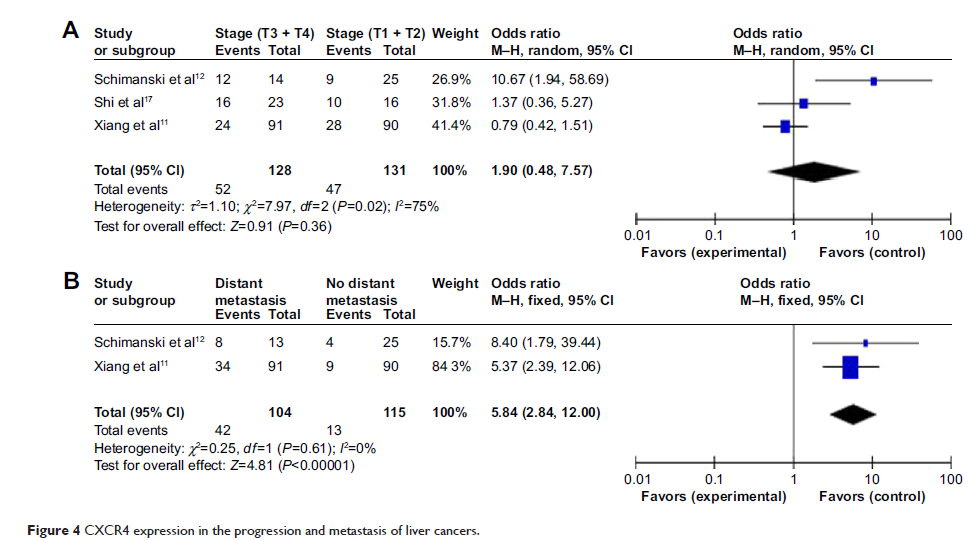109669
论文已发表
注册即可获取德孚的最新动态
IF 收录期刊
- 3.4 Breast Cancer (Dove Med Press)
- 3.2 Clin Epidemiol
- 2.6 Cancer Manag Res
- 2.9 Infect Drug Resist
- 3.7 Clin Interv Aging
- 5.1 Drug Des Dev Ther
- 3.1 Int J Chronic Obstr
- 6.6 Int J Nanomed
- 2.6 Int J Women's Health
- 2.9 Neuropsych Dis Treat
- 2.8 OncoTargets Ther
- 2.0 Patient Prefer Adher
- 2.2 Ther Clin Risk Manag
- 2.5 J Pain Res
- 3.0 Diabet Metab Synd Ob
- 3.2 Psychol Res Behav Ma
- 3.4 Nat Sci Sleep
- 1.8 Pharmgenomics Pers Med
- 2.0 Risk Manag Healthc Policy
- 4.1 J Inflamm Res
- 2.0 Int J Gen Med
- 3.4 J Hepatocell Carcinoma
- 3.0 J Asthma Allergy
- 2.2 Clin Cosmet Investig Dermatol
- 2.4 J Multidiscip Healthc

已发表论文
关于 C-X-C 趋化因子受体 4 型作为预后标志和在肝癌治疗中的潜在药物靶标的一项荟萃分析
Authors Hu F, Miao L, Zhao Y, Xiao YY, Xu Q
Published Date July 2015 Volume 2015:9 Pages 3625—3633
DOI http://dx.doi.org/10.2147/DDDT.S86032
Received 3 April 2015, Accepted 8 May 2015, Published 15 July 2015
Abstract: Chemokines (CKs), small proinflammatory chemoattractant cytokines that
bind to specific G-protein coupled seven-span transmembrane receptors, are
major regulators of cell trafficking and adhesion. C-X-C chemokine receptor
type 4 (CXCR4) has gained tremendous attention over the last decade, since it
was found to be upregulated in a wide variety of cancer types, including
hepatocellular carcinoma (HCC). The clinical relevance of expression of CXCR4
in HCC remains controversial; our aim was to identify the precise relationship
of CXCR4 to prognosis and clinicopathological features. We searched the
database from MEDLINE, PubMed, Web of Science, Scopus and Embase and then
conducted a meta-analysis from publications met the inclusion criteria for the
qualitative study. Our data showed that 1) CXCR4 is overexpressed in HCC
tissues but not in normal hepatic tissue, OR =84.26, 95% confidence interval
(CI) =11.86–598.98, P <0.0001.
CXCR4 expression is higher in HCC than those in cirrhosis as well, OR =20.71,
95% CI =7.61–56.34, P <0.00001. 2)
The expression levels of CXCR4 does not increase during local progression,
however, CXCR4 expression increases the risk of distant metastases in HCC, OR
=5.84, 95% CI =2.84–12.00, P <0.00001. 3)
High levels of CXCR4 gene expression are
associated with worse survival in HCC, HR =0.18, 95% CI =0.10–0.32, Z =5.77, P <0.00001.
These data indicate that CXCR4 expression correlates with an increased risk and
worse survival in HCC patients. The aberrant CXCR4 expression plays an
important role in the carcinogenesis and metastasis of HCC. Our conclusion also
supports that the promise of CXCR4 signaling pathway blockade as a potential
strategy for HCC patients.
Keywords: CXCR4, CXCL12, prognosis, marker, hepatocellular carcinoma, cirrhosis, meta-analysis
Keywords: CXCR4, CXCL12, prognosis, marker, hepatocellular carcinoma, cirrhosis, meta-analysis
